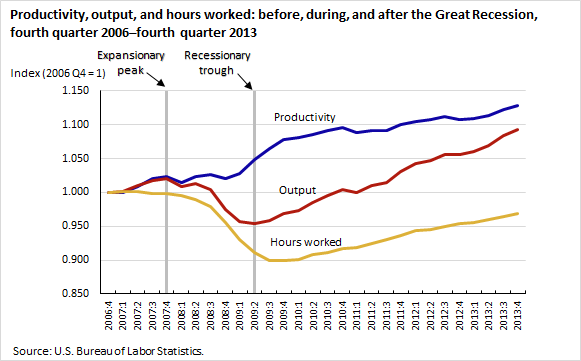Interesting article about Costa Rica which is top of tables in life expectancy, and social well being with a comparatively low GDP.
"Every few years the New Economics Foundation publishes the
Happy Planet Index – a measure of progress that looks at life expectancy, wellbeing and equality rather than the narrow metric of GDP, and plots these measures against ecological impact. Costa Rica tops the list of countries every time. With a life expectancy of 79.1 years and levels of wellbeing in the top 7% of the world, Costa Rica matches many Scandinavian nations in these areas and neatly outperforms the United States. And it manages all of this with a GDP per capita of only $10,000 (£7,640), less than one fifth that of the US."
Want to avert the apocalypse? Take lessons from Costa Rica
The key is providing a rich set of social services and promoting equality. This means providing people with the basics of food, shelter, health care, etc. This is done through redistribution from high income people to low income people.
This bit is crucial:
"All of this turns the usual growth narrative on its head. Henry Wallich, a former member of the US Federal Reserve Board, once pointed out that “growth is a substitute for redistribution”. And it’s true: most politicians would rather try to rev up the GDP and hope it trickles down than raise taxes on the rich and redistribute income into social goods. But a new generation of thinkers is
ready to flip Wallich’s quip around: if growth is a substitute for redistribution, then redistribution can be a substitute for growth. "
"How do they do it? Professors Martínez-Franzoni and Sánchez-Ancochea
arguethat it’s all down to Costa Rica’s commitment to universalism: the principle that everyone – regardless of income – should have equal access to generous, high-quality social services as a basic right. A series of progressive governments started rolling out healthcare, education and social security in the 1940s and expanded these to the whole population from the 50s onward, after abolishing the military and freeing up more resources for social spending."
Interesting note on how they kept the US from "intervening" to prevent progressive idea from taking hold:
"Costa Rica wasn’t alone in this effort, of course. Progressive governments elsewhere in Latin America made similar moves, but in nearly every case the US violently intervened to stop them for fear that “communist” ideas might scupper American interests in the region. Costa Rica escaped this fate by outwardly claiming to be anti-communist and – horribly – allowing US-backed forces to use the country as a base in the contra war against Nicaragua."
"This is what ecologists call “de-growth”. This calls for redistributing existing resources and investing in social goods in order to render growth unnecessary. Decommoditising and universalising healthcare, education and even housing would be a step in the right direction. Another would be a universal basic income – perhaps funded by taxes on carbon, land, resource extraction and financial transactions."
The real benefit:
"The opposite of growth isn’t austerity, or depression, or voluntary poverty. It is sharing what we already have, so we won’t need to plunder the earth for more."
"Past a certain point, GDP
gains us nothing when it comes to what really matters. In an age of climate change, where the pursuit of ever more GDP is actively dangerous, we need a different approach."







